PEP人教版五年级英语下册Unit3知识点归纳.doc
人教版PEP五年级英语下册第三单元知识点、练习(含答案)
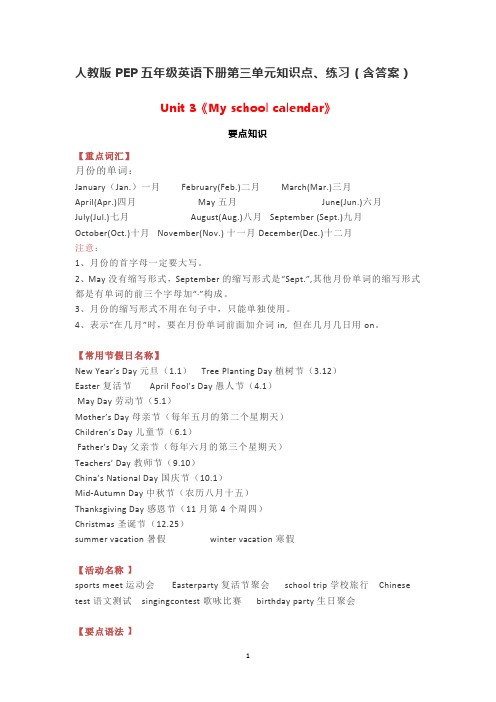
人教版PEP五年级英语下册第三单元知识点、练习(含答案)Unit 3《My school calendar》要点知识【重点词汇】月份的单词:January(Jan.)一月February(Feb.)二月March(Mar.)三月April(Apr.)四月 May五月June(Jun.)六月July(Jul.)七月August(Aug.)八月 September (Sept.)九月October(Oct.)十月 November(Nov.) 十一月 December(Dec.)十二月注意:1、月份的首字母一定要大写。
2、May没有缩写形式,September的缩写形式是“Sept.”,其他月份单词的缩写形式都是有单词的前三个字母加“·”构成。
3、月份的缩写形式不用在句子中,只能单独使用。
4、表示“在几月”时,要在月份单词前面加介词in, 但在几月几日用on。
【常用节假日名称】New Year’s Day元旦(1.1) Tree Planting Day 植树节(3.12)Easter 复活节April Fool’s Day愚人节(4.1)May Day 劳动节(5.1)Mother’s Day母亲节(每年五月的第二个星期天)Children’s Day儿童节(6.1)Father’s Day父亲节(每年六月的第三个星期天)Teachers’ Day教师节(9.10)China’s National Day国庆节(10.1)Mid-Autumn Day 中秋节(农历八月十五)Thanksgiving Day 感恩节(11月第4个周四)Christmas圣诞节(12.25)summer vacation暑假winter vacation寒假【活动名称】sports meet 运动会 Easterparty 复活节聚会 school trip 学校旅行 Chinese test 语文测试 singingcontest歌咏比赛 birthday party生日聚会【要点语法】1. 介词in 、on、at的用法。
(完整版)人教版五年级英语下册Unit3 知识点整理
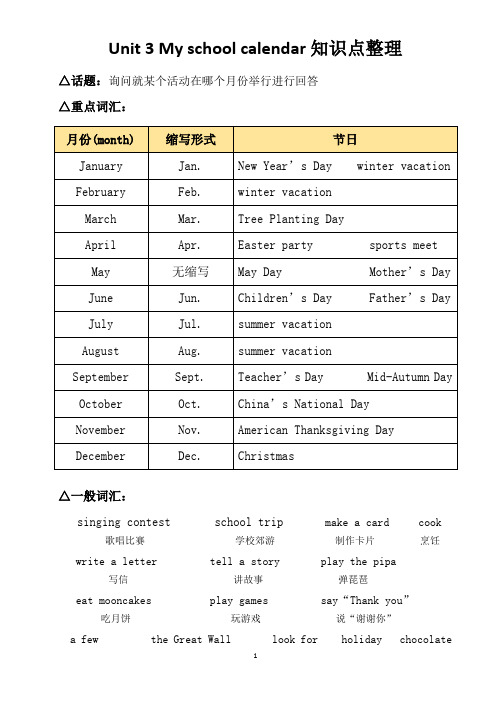
Unit3My school calendar知识点整理△话题:询问就某个活动在哪个月份举行进行回答△重点词汇:△一般词汇:singing contest school trip make a card cook 歌唱比赛学校郊游制作卡片烹饪write a letter tell a story play the pipa写信讲故事弹琵琶eat mooncakes play games say“Thank you”吃月饼玩游戏说“谢谢你”a few the Great Wall look for holiday chocolate一些长城寻找假期巧克力 birthday parents will after month bunny 生日父母亲将要在……之后月份兔子△句型:①询问某活动/节日的日期When is Children’s Day?儿童节是在什么时候?——It’s in June. 它在六月。
②表达某人将要做某事(将来时)What will you do in October?在十月你们将做什么?——We will go to the Great Wall. 我们将要去长城。
What will you do for your mother on Mother’s Day?在母亲节你将为你妈妈做什么?——I will cook for my mum. 我将为我妈妈做饭。
【拓展:will+动词原形】③同一个问句反问别人What about you? = How about you?= And you?(你呢?)△知识点:1.in+月份 in June (在六月)2.on+几月几日/节日on March 23rd / on Mother’s Day3.五月May没有简写形式。
九月September的简写形式是前四个字母加点Sept. 其他十个月的简写形式是前三个字母加点。
4.无论是完全形式还是简写形式,表示12个月的单词的第一个字母都要大写。
PEP五年级英语下册Unit1-6重点知识小结

Unit 1 This Is My Daydo morning exercises晨练eat breakfast吃早饭have english class上英语课play sports进行体育运动eat dinner吃晚饭when什么时候evening夜晚;晚上get up起床at在……点钟usually通常;一般noon中午climb mountains爬山go shopping购物;买东西play the piano弹钢琴visit grandparents看望祖父母go hiking去远足weekend周末often经常sometimes有时候话题1:日常生活时态:一般现在时1.When do you do morning exercises? 你什么时候做早操?I usually do morning exercises at 8:00. 我经常八点钟做早操。
(I usually get up at 12:00 at noon . 我经常在中午十二点起床。
) 2.When do you eat dinner ? 你什么时候吃晚餐?I eat dinner at 7:00 in the evening. 我在晚上七点种吃晚餐。
3.When is the best time to go to Beijing? Fall. 最好在什么时候去北京?秋天。
Unit 2 My Favourite Seasonspring春天summer夏天fall秋天winter冬天season季节which哪一个best最;极swim游泳fly kites放风筝skate滑冰make a snowman堆雪人plant trees种树why为什么because因为sleep 睡觉话题2:季节时态:一般现在时1.Which season do you like best ? I like spring best.(Spring.)你最喜欢是什么季节?我最喜欢春季。
小学英语人教版PEP五年级下册1-6单元知识点总结

Unit1 My day一、基本句型1.询问什么时候做某事:- When do you ……?你什么时候……?- I usually…at …. 我通常在…(点钟)…。
例:-When do you eat breakfast?-I eat breakfast at 7:00.2.What do you do on the weekend?你周末做什么?- I +频率副词+周末活动+时间。
或Sometimes I+周末活动例句:I sometimes go shopping with my mum on the weekend.(周末我时候和妈妈一起去购物)二、知识点:1.频率副词:always(总是,一直)>usually(通常)>often(经常)>sometimes(有时)2.只有Sometimes可以放在句首。
(Sometimes I cook dinner.)3.On the weekend 在周末on Saturdays 在周六on Sundays在周日(别忘加s)Unit2 My favourite season1.-Which season do you like best? (你最喜欢哪个季节?)Why?(为什么)-I like +季节+ best.(I like spring∕summer∕fall∕winter best) Because ___________.(因为)或:-What‘s your favourite season? -My favourite season is spring∕summer∕fall∕winter.2.-Why do you like winter best?(你为什么最喜欢冬天?) -Because______.二、知识点:1.leaf(树叶):复数leaves2.W,W真神奇,问出许多大问题。
what,what,问“什么”,when,when,问“时间”,where,where,问“哪里”,which,which,“哪一个”,why,why,“为什么”.Unit3 My school calendar补充:1.Dragon Boat Festival 龙舟节或端午节(农历五月五日)一般在阳历6月2.月份首字母大写。
英语五年级下册第三单元知识点
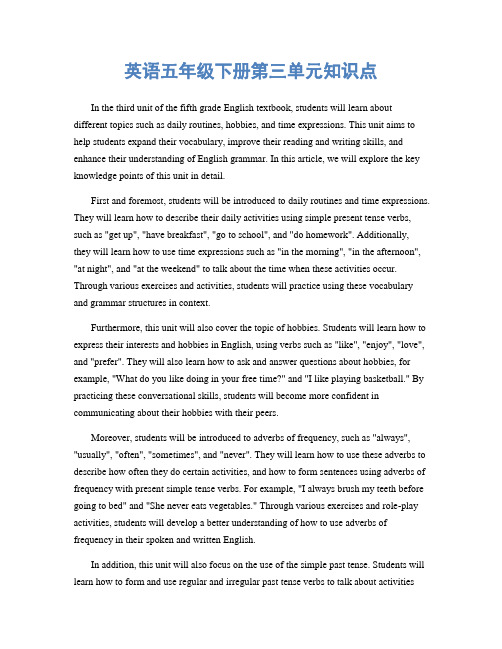
英语五年级下册第三单元知识点In the third unit of the fifth grade English textbook, students will learn about different topics such as daily routines, hobbies, and time expressions. This unit aims to help students expand their vocabulary, improve their reading and writing skills, and enhance their understanding of English grammar. In this article, we will explore the key knowledge points of this unit in detail.First and foremost, students will be introduced to daily routines and time expressions. They will learn how to describe their daily activities using simple present tense verbs, such as "get up", "have breakfast", "go to school", and "do homework". Additionally, they will learn how to use time expressions such as "in the morning", "in the afternoon", "at night", and "at the weekend" to talk about the time when these activities occur. Through various exercises and activities, students will practice using these vocabulary and grammar structures in context.Furthermore, this unit will also cover the topic of hobbies. Students will learn how to express their interests and hobbies in English, using verbs such as "like", "enjoy", "love", and "prefer". They will also learn how to ask and answer questions about hobbies, for example, "What do you like doing in your free time?" and "I like playing basketball." By practicing these conversational skills, students will become more confident in communicating about their hobbies with their peers.Moreover, students will be introduced to adverbs of frequency, such as "always", "usually", "often", "sometimes", and "never". They will learn how to use these adverbs to describe how often they do certain activities, and how to form sentences using adverbs of frequency with present simple tense verbs. For example, "I always brush my teeth before going to bed" and "She never eats vegetables." Through various exercises and role-play activities, students will develop a better understanding of how to use adverbs of frequency in their spoken and written English.In addition, this unit will also focus on the use of the simple past tense. Students will learn how to form and use regular and irregular past tense verbs to talk about activitiesthat happened in the past. They will also learn how to ask and answer questions about past events, for example, "What did you do last weekend?" and "I visited my grandparents." By practicing the simple past tense in context, students will be able to express themselves more fluently when talking about past experiences.Finally, students will have the opportunity to consolidate their learning through various activities such as reading comprehension exercises, writing tasks, and speaking activities. They will also have the chance to engage in pair and group work, where they can practice using the language in a more interactive and communicative way.In conclusion, the third unit of the fifth grade English textbook covers a wide range of topics including daily routines, hobbies, time expressions, adverbs of frequency, and the simple past tense. By mastering the key knowledge points of this unit, students will be able to enhance their English language skills and become more confident and proficient English speakers and writers.。
最新五年级下册英语第三单元知识点整理
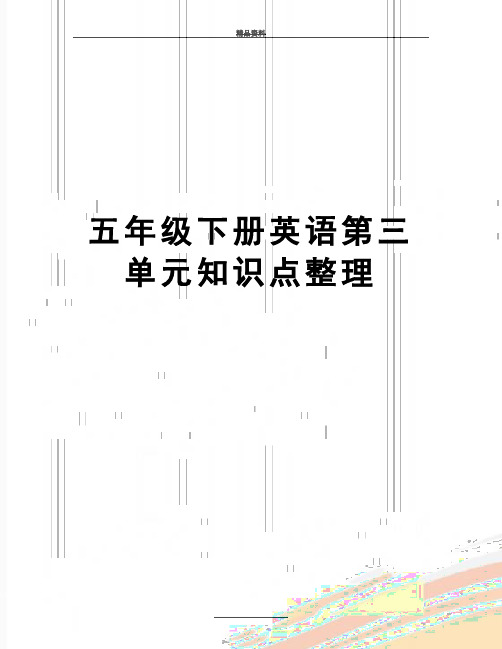
精品资料五年级下册英语第三单元知识点整理........................................五年级下册英语第三单元知识点整理五年级下册英语第三单元知识点整理一、主要单词:January (Jan.)一月 February (Feb.)二月March (Mar.)三月April(Apr.)四月May 五月June 六月 July 七月 August (Aug.)八月September(Sept.)九月October( Oct.)十月November (Nov.)十一月 December ( Dec.)十二月二、主要句子1. Wur birthday? 你的生日是什么时候 --It's in May. 在五月。
2. My birthdaune. Uncle Bill's birthdau 我的生日在六月。
比尔叔叔的生日也在六月。
3. Is her birthday in June? 她的生日在六月吗? --Yes. 是的。
4.What's the date? 是几月几日? --Ju六月九日。
5. What's the date today? 今天是几月几日? -- It's April 10th. 四月十日。
三、主要知识点:1、关于月份:(1)五月May , 六月June, 七月July,没有简写形式。
九月September 的简写形式是前四个字母加点Sept. 其他八个月的简写形式是前三个字母加点。
(2)无论是完全形式还是简写形式,表示12个月的单词的第一个字母都要大写。
2、关于基数词变序数词。
(1)一般情况下,直接在基数词后面加th. (one , tw除外)。
one-wo-second-third .(2)以ve结尾的基数词,变ve为f, 再加th. 如:five-welve-twel (3)以t结尾的基数词,直接加h.如eight-eig (4)以不发音的字母e结尾的,丢掉不发音的字母e,再加th. 如 nine- (5)以y结尾的整十数,在变为序数词时,将y变为ie, 再加th. 如twenty-tw (6)20以上的两位数,变为序数词时,十位数不变,只将个位上的数变为序数词。
人教版英语五年级下册第三单元
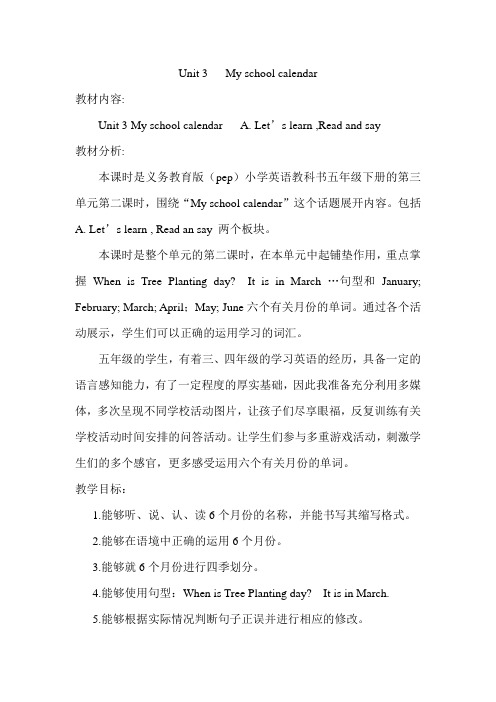
Unit 3 My school calendar教材内容:Unit 3 My school calendar A. Let’s learn ,Read and say教材分析:本课时是义务教育版(pep)小学英语教科书五年级下册的第三单元第二课时,围绕“My school calendar”这个话题展开内容。
包括A. Let’s learn , Read an say 两个板块。
本课时是整个单元的第二课时,在本单元中起铺垫作用,重点掌握When is Tree Planting day? It is in March …句型和January; February; March; April;May; June六个有关月份的单词。
通过各个活动展示,学生们可以正确的运用学习的词汇。
五年级的学生,有着三、四年级的学习英语的经历,具备一定的语言感知能力,有了一定程度的厚实基础,因此我准备充分利用多媒体,多次呈现不同学校活动图片,让孩子们尽享眼福,反复训练有关学校活动时间安排的问答活动。
让学生们参与多重游戏活动,刺激学生们的多个感官,更多感受运用六个有关月份的单词。
教学目标:1.能够听、说、认、读6个月份的名称,并能书写其缩写格式。
2.能够在语境中正确的运用6个月份。
3.能够就6个月份进行四季划分。
4.能够使用句型:When is Tree Planting day? It is in March.5.能够根据实际情况判断句子正误并进行相应的修改。
6.能够听懂、会说、会表演对话情景,能在真实语境中运用所学句型完成问答交流活动。
教学重、难点:1.重点:(1)掌握重点词汇和重点句型,并能在实际语境中正确运用。
(2)逐步学会听、说、读、写单词或词组January、February、March、April、May、June、winter vacation。
2.难点:(1)能够掌握January和February的正确发音。
人教版小学PEP英语五年级下册第三单元知识点归纳
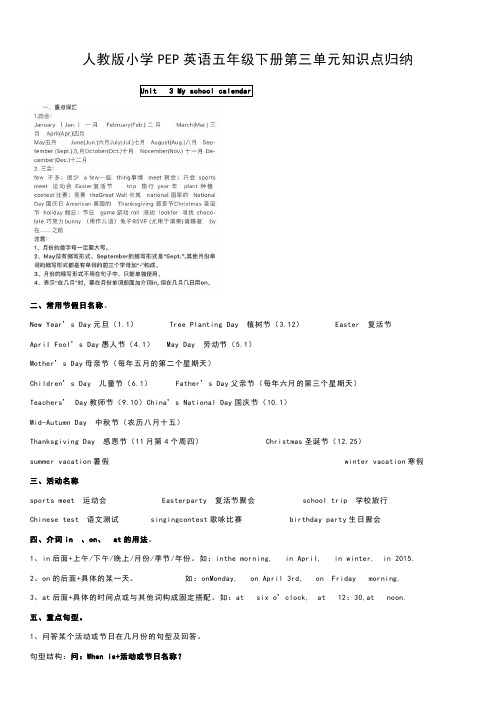
人教版小学PEP英语五年级下册第三单元知识点归纳Unit 3 My school calendar二、常用节假日名称。
New Year’s Day元旦(1.1)Tree Planting Day 植树节(3.12)Easter 复活节April Fool’s Day愚人节(4.1) May Day 劳动节(5.1)Mother’s Day母亲节(每年五月的第二个星期天)Children’s Day 儿童节(6.1)Father’s Day父亲节(每年六月的第三个星期天)Teachers’ Day教师节(9.10)China’s National Day国庆节(10.1)Mid-Autumn Day 中秋节(农历八月十五)Thanksgiving Day 感恩节(11月第4个周四)Christmas圣诞节(12.25)summer vacation暑假winter vacation寒假三、活动名称sports meet 运动会Easterparty 复活节聚会school trip 学校旅行Chinese test 语文测试singingcontest歌咏比赛birthday party生日聚会四、介词in 、on、at的用法。
1、in后面+上午/下午/晚上/月份/季节/年份。
如:inthe morning, in April, in winter, in 2015.2、on的后面+具体的某一天。
如:onMonday, on April 3rd, on Friday morning.3、at后面+具体的时间点或与其他词构成固定搭配。
如:at six o’clock, at 12:30,at noon.五、重点句型。
1、问答某个活动或节日在几月份的句型及回答。
句型结构:问:When is+活动或节日名称?答:It’s in+月份。
例:问:When is Christmas?(圣诞节在什么时候?)答:It’s in December.(在十二月。
- 1、下载文档前请自行甄别文档内容的完整性,平台不提供额外的编辑、内容补充、找答案等附加服务。
- 2、"仅部分预览"的文档,不可在线预览部分如存在完整性等问题,可反馈申请退款(可完整预览的文档不适用该条件!)。
- 3、如文档侵犯您的权益,请联系客服反馈,我们会尽快为您处理(人工客服工作时间:9:00-18:30)。
Unit 3 My Birthday知识点归纳一、词汇
月份
三会单词
Dec. December ( 十二月 )
Jan. January ( 一月 )winter
Feb. February (二月
Mar. March (三月)
Apr. April(四月)spring
May(五月)
June(六月)
July(七月)summer
Aug. August( 八月 ) Sept.
September ( 九月 ) Oct.
October ( 十月 ) fall Nov.
November(十一月)
序数词
其他
first(第一)
second (第二)
third(第三)
fourth(第四)
fifth(第五
eighth(第八)
ninth(第九)
twelfth(第十)
twentieth(第二十)
birthday(生日)
uncle(叔叔,舅舅)
her(她的)
date(日期)
chart图表cousin堂(表)兄弟/姐妹send发送,e-card电子卡片able能everyone每个人then那么
二、重点句型
1、问时间
① —— When is your birthday你的生日是什么时候
—— My birthday is in June .我的生日在六月。
② —— Is her birthday in June她的生日是在七月吗
—— Yes.是的。
(注:月份前面用in )
2 、询问日期
—— What’s the date(几月几号)
—— It’s June 1st.(六月一号)
3、 Uncle Bill’s birthday is in June, too.(比尔叔叔的生日也是在六月)
三、知识点讲解
1 、名词所有格 , 表示:的
(1)、名词后加’ s , 如 John’s 约翰的 , your father ’s你爸爸的, Uncle Bill’s比尔叔叔的
(2)、特殊情况:以s结尾的名词加’,如the teachers’
2、节日的名词
New Year’s Day新年(January 1st)
Women’s Day 妇女节( March 8 th)读: March the eighth Tree-planting Day植树节( March 12th )
Labor Day 劳动节(或May Day)(May 1 st )
Children ’s Day 儿童节(June 1 st )
Army Day 建军节( August 1 st )
Teachers ’Day 教师节( September 10 th )
National Day Christmas Day 国庆节( October 1 st)
th 圣诞节( December 25 )
Spring Festival 春节
3. 注意区分两个句子:What day is it today
What ’s the date today 今天星期几 (day: 天,日子 ) 今天是几月几日( date: 日期)
4.What are you doing 你在做什么此句是现在进行时态,表示对正在发生的动作的提问。
回答
时用 I ’m+动词 -ing (现在分词)+其他。
如: I ’m sending an e-card.
make ( 现在分词 ) →making. send( 现在分词 ) →sending.
5.陈述句变为一般疑问句: My birthday is in February .
Is your birthday in February
Her birthday is in June.
Is her birthday in June
6、读序数词时,前面一定要加the.如October 1st .读作October the first.
7、同义句:
Who has a birthday in October==Whose birthday is in October
8、序数词的简写形式为表示该词的阿拉伯数字加上该单词的最后两个字母,最后两个字母要变成上标格式。
如: first — 1st , second —2nd , third — 3rd , fourth —4th . twentieth —20th。
